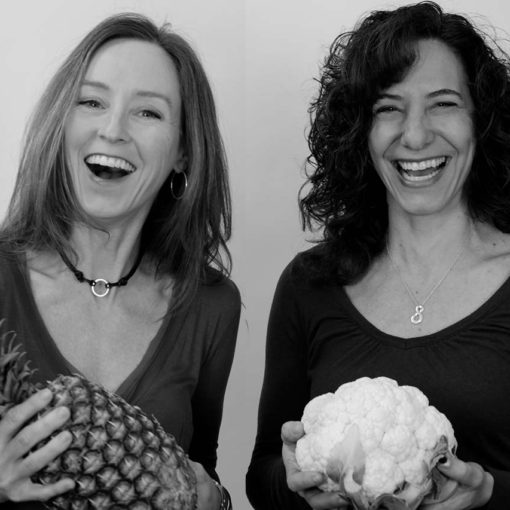Podcast: Play in new window | Download (Duration: 14:17 — 5.0MB)
Subscribe and don't miss an episode! Apple Podcasts | Spotify | Android | iHeartRadio | Deezer | RSS
This is part three of our sweet cravings episodes where we get down to how to actually deal with those persistent sugar cravings. It’s not about going cold turkey or depriving yourself of sweet treats–it’s about strategizing and mindfulness.
Transcription of the Nourish Noshes Podcast Sweet Cravings Part 3
Edited for clarity.
Debbie 00:00
This is part three of the series of sugar and we’re reintroducing this podcast again, because it’s six years old but still relevant. And we hope you listen to the first two. And if you haven’t go back and listen to part one and two, and let us know what you think.
Wendy 00:15
You know, I think one of the things about sugar is that it’s universally alluring. You know, not one person hasn’t been allured and tempted and overindulged in sugar. And so this is, you know, sugar is definitely a universal language. And so, if you’ve got friends, you want to share this with, we encourage you to pass it along.
Debbie 00:39
Yeah. Enjoy. Here we are, at part three of why we love sugar. And in the first couple parts, we talked about what sugar does to our bodies, and how we react to sugar. And in the second part, we’ve talked about all the different kinds of sugars. So today, we’re gonna talk about, what do we do with sugar? How do we deal with the cravings? How do we get it out of our life in such an addictive way? So . . .
Wendy 01:05
This is one of the biggest challenges from our clients. Right? It’s the temptation and it’s part of everyday living: it’s there for breakfast, lunch, and dinner; it’s there at parties and celebrations. It’s everywhere we turn. It’s on every corner.
Debbie 01:20
Yeah, we can’t really avoid it. It’s it, we actually, as we talked about, in our first couple of podcasts, we need sugar. So it’s not like alcohol or drugs, where you can go cold turkey and not have them anymore and live perfectly healthy,
Wendy 01:32
Right. We’ve got to acknowledge that it’s really hard, you know, that this, this truly is a challenge for us on a regular basis. It’s not like, all of a sudden, one day, we can say, you know, I’m no longer attracted to sugar. And we also need to acknowledge too that we’re all just a little bit different, you know, in a family of four, everybody’s just a little bit different. You all love it, but some people are more attracted to it than others.
Debbie 01:58
And that you’re right, you bring up another challenge to that if you’re not living alone. Most of us aren’t, you have to deal with the people you’re living with who may not be on board with you may be trying to limit your sugar. So there might be sugar in your house when you’re trying to avoid it. And that makes a challenge as well.
Wendy 02:13
Yeah. So there are temptations everywhere. And you brought up a good point the other day, that it’s just like drugs and alcohol in some ways that there’s some shame attached to this addiction that we have. I thought that was a really interesting idea that, because we like it so much.
Debbie 02:32
And yeah, there is a shame. It’s like people feel that they’re bad or wrong, that they can’t handle themselves that they’re out of control. And there’s a shame attached to that people hide it, just like they do alcohol and drugs, they hide the sugar consumption, I can think of just a couple people off the top of my head. Yeah, who do that? Yeah. So we want to get away from that shame and understand that it’s, it’s so normal. First of all, it’s so normal, and there are ways to address it. And it’s an ongoing thing. It’s not something you can address today, and then it’ll be gone. Right? It’s, um, it’s a behavior management. So that’s, that’s a big part of it. And to get rid of the shame, you know, accept yourself for “I love sugar,” “I have trouble moderating sugar,” but it’s okay. You know, that’s one of my works, right?
Wendy 03:21
That’s one of the challenges.
Debbie 03:22
There’s also one of the challenges that we wanted to mention, too, was all of the competing messages out there. So it’s not just your own battle, that it tastes good, and that it’s around everywhere else. It’s also that there’s messages out there, that sweet makes happiness, right? And that sweet makes you feel better. I was talking about when I was a mother of infants, and they were going to the doctor when they would go to the doctor of all places, they would leave with lollipops, because you know, they were “good kids”. Here’s a reward. Some sugar! So yeah.
Wendy 03:55
When we grow up that way, in society, we tend to say if if I’m good, therefore I get a treat.
Debbie 04:02
That’s right. And that’s what dessert is all about too. Most parents say you can’t have dessert until you have your meal. That’s the reward. That’s the “here’s something sweet for something you’ve done.” That’s a hard message to undo.
Wendy 04:13
Yes. Well, I think we also need to acknowledge though, even though the media says that sugar equals happiness, it does give us actually a little bit of, you know, it does make us feel good. It’s an instant gratification and we are actually happy but it’s for often just a very short amount of time, and then we’re very unhappy, right? And it’s hard to remember.
Debbie 04:38
That’s right, that roller coaster that that’s exactly what it is. If it is a roller coaster because you feel good. And then you feel wooooo, and then you really down low, right?
Wendy 04:47
And so then you want some more sugar so you get back up again, right?
Debbie 04:52
And roller coasters are fun temporarily, but not every day all the time.
Wendy 04:55
It can make you sick if you’re on it all the time.
Debbie 04:58
Exactly. Imagine yourself on a roller coaster every day all the time. Not fun.
Wendy 05:01
And we do want to acknowledge just we said in the very beginning, our first podcast was that sugar was the root of inflammation, which is the root of dis-ease as well.
Debbie 05:10
That’s right, it often is the basis of most problems in people’s health.
Wendy 05:16
So let’s talk about strategies for dealing with sugar because that’s what this podcast is really all about.
Debbie 05:22
And I think the first thing to talk about with dealing with sugar and your cravings is awareness.
Wendy 05:28
That’s the starting point for all heal, right is the awareness of the messages our body’s telling us when something’s going on.
Debbie 05:35
And not being mindless. So, instead of mindlessly grabbing that candy that’s out in the bowl in your office, it’s actually thinking about, “Oh, there’s a bowl of candy. I want some. Should I have it? I know, it won’t make me feel good.” That awareness can make that decision, you know, a mindful one and maybe have you choose the better decision. So it’s all about being aware of your body being aware of your thoughts. So that mindlessness doesn’t happen in your choice.
Wendy 06:02
It really is a journey. This is something that we’re gonna have to deal with. We also encourage people not to say, “Okay, as of Monday, I’m going to cut sugar out of my diet,” right? Because for so many of us, we’re going to have celebrations; we’re going to have vacations and connections with people. And so if we say never, and then break our promise, you know, we’re not perfect people.
Debbie 06:26
No. It’s forgiving yourself. It’s the awareness. It’s letting yourself have some, you know, for for me once in a while, if I’m at a wedding, or I’m at a celebration, there’s couple of graduations coming up, I know there’s going to be some things out there that are going to tempt me. And I’m going to be mindful about what I choose. But I may choose to have some some sweets, right, but it’s that day by itself. It doesn’t have to happen the day before. It doesn’t have to happen the day after. It’s going to be that day by itself that I choose. Okay, I’ll have this one treat.
Wendy 06:53
Well, and that one treat is a very interesting idea too, because actually a story of one of my clients is that there’s a bakery around the corner from her house. She knows the family. They make delicious, homemade completely from the earth ingredients. And she loves their macaroons, but she buys 10 instead of one, two or three, and she eats them on her way home. So they’re completely gone by the time she gets home.
Debbie 07:19
She binges on them.
Wendy 07:20
Yeah, so we’ve created a new ritual for her that when she buys some, it’s one two or three and she actually takes it home, she pours herself a cup of tea and she sits and really smells them and tastes them. She’s savoring it and enjoying it and feeling the happiness that she has when she’s having these homemade macaroons. And she’s experienced it once now. And she said it was the biggest challenge to actually get home without going into the bag. But she said it, it she loved it. And she was full and she was very much more content.
Debbie 07:56
Yep, that is such a good point. And I think that’s a strategy that people can take right now. And that’s part of the shame. You know, I think that she probably had all the 10 in the car on the way there sort of almost to get it over with, you know, and so it’s a matter of, okay, if you’re going to allow yourself this one thing, really savor it, because if you actually pay attention to all the tastes and textures and how it feels in your mouth, and, and if you’re sitting in a nice peaceful place or doing something that you enjoy, it’s going to be such an enjoyable thing, right, just having that one instead of rushing out of shame to get it down and feeling kind of junky afterwards.
Wendy 08:35
Or for some people, they might sit there and try to savor it and be like, this doesn’t actually really taste good. Actually, this whatever they might have chosen as their, I’m just going to call it a donut, for example. And they realize that they just don’t even like the donut. It’s just become a habit for them on Saturday or Sunday morning.
Debbie 08:54
Very true. I’ve had that experience myself. I realized I went for a year without having any processed sugar and really not having any sugar products. It was just sweet foods like carrots and root vegetables. So I didn’t ever have any refined sugar treats for one year I was being macrobiotic. And when I started having sugar again, I realized I didn’t really like some of the things that I used to love.
Wendy 09:20
Oh, yeah.
Debbie 09:20
And it never tasted as good as it looked.
Wendy 09:23
Oh!.
Debbie 09:23
And still, to this day. So that’s a strategy I use with my clients. You know, look at that you’ve probably had it 100 times in your life. Remember what it tastes like? Remember the textures. Maybe you don’t need to have it at all once you go through that imagination. But the other thing is, you know, most of the time, I think, and people have agreed with me, it doesn’t taste as good as you remember it. Or that it looks and, so is it really worth it? And I’ve talked myself out of many things, thankfully, not being upset about it because I had that memory. You know, it just didn’t taste as good as it looks right? So it’s not worth it.
Wendy 09:57
Sticking with the awareness. I also, just the idea that maybe you’re not actually needing a sweet right then. You know, maybe what you’re looking for is a hug or a conversation with a good friend, or, you know, some intimacy with your partner or something like that instead of actually wanting the sugar.
Debbie 10:17
Which is interesting how we use language that way, when we talk about that being sweet, or someone being sweet. Yeah, because it is the same fulfilling feeling we often get, although much longer lasting and much healthier.
Wendy 10:29
Right.
Debbie 10:31
So that is it’s finding the sweet, not in foods. It’s finding the sweet in life: dancing. You know, I have heard about people dancing on their own when they got a sweet craving, and they just put some music on and started dancing. And it kind of did what it needed to do. I know that sounds so simple, and I don’t mean to to make it seem like Oh, don’t worry about your cravings. Just go and have a dance. But it is a lot of that time. So seek out that friend or that music or all those things you mentioned before. And one of the things that we talk about is the future self. Yeah, I love that. Can you explain that?
Wendy 11:04
Yeah, the future self is actually, you know, taking a camera and maybe creating a movie of yourself, you know, five minutes down the road, maybe an hour down the road, or even five years down the road? What will I feel like, look like? What’s my performance going to be? If I have this right now, how am I going to feel later?
Debbie 11:24
And will your future self like this self right now? Right? Or be upset with that person? What they decided to do, right?
Wendy 11:30
Yeah.
Debbie 11:31
So yeah, I do that off of myself, not only with treats, but with other things like chores, I don’t want to do, right, I get myself to do them. Because I think of my future self will be really upset with me for not doing that. Right. That’s a good strategy.
Wendy 11:44
So we talked a little bit, too, about having other people in the house. Creating boundaries for ourselves is another really important strategy. And if you have control over the cabinets in the house, one of the boundaries is not having it available in the house, right. So if you have the opportunity, you know, the boundary is not having it in the house. Or maybe there’s a cabinet that’s not your cabinet, it’s cabinets for other people in the house, if there’s not an opportunity to shift everybody in the house to the way you’re eating, right. So, creating boundaries. So, another wonderful boundary that you and I talked with our clients about a lot is actually switching, if you’re going to have something sweet during the day, it’s often really good to have it right after lunch. Instead of having it dinner, having it right after lunch and not having it you know, right in the middle of the day, that three o’clock or four o’clock lull that a lot of people you know, tend to go for it, instead of between meals, have it as a treat at the end of lunch with the meal. Your body will absorb it and respond to it on a chemical level differently.
Debbie 12:50
Yeah, that’s the best time of the day to eat anyway. So that’s when you throw that extra calories in. Your body can handle it much better than at the end of the day or in between meals. So, removing it from your house or having an agreement with your family members to either have them not bring stuff in or have their own cabinets that you’re not going to go in. It’s recruiting your family for support. Saying, ‘hey listen, I’m really trying, can you keep it out of my sight, don’t tell me where it is, or whatever it is– really trying to get your family’s support. And if you have kids that are small, and you’re worried about that, that to me is not an excuse, because maybe they shouldn’t be having it either. And you’re in charge, right? It shouldn’t be in the house for you or for them. So that’s not an excuse– “but my kids like it”.
Wendy 13:34
So, we’ve really enjoyed sharing these podcasts with you these last strategies of awareness of behavior modification and for finding other sweet things in your life. We hope these strategies of dealing with sugar has been supportive.
Debbie 13:49
And if you have strategies that we haven’t mentioned that would also be helpful to others. If you want to add your comments to our Facebook page or on our blog, that would be great to hear what you’ve done to help your journey along and not submitting to the sweet temptations.
Nourish Coaches 14:03
Thanks for listening. Keep the conversation going at NourishCoaches.com and stay tuned for more Nourish Noshes as we continue our quest to make the world a healthier place.






